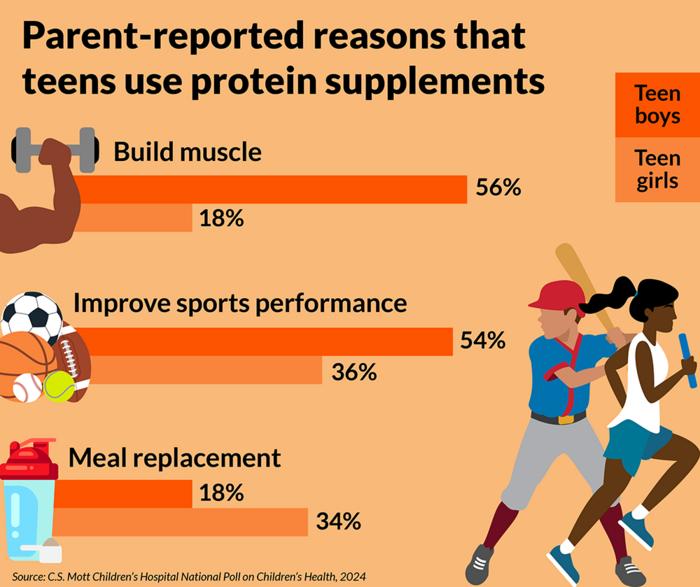A new national poll shows that protein supplement use among teenagers is more widespread than many might expect, with teen boys being particularly frequent consumers.
Summary: A University of Michigan Health poll finds that two in five parents report their teens have used protein supplements in the past year, with usage higher among boys for muscle growth and sports performance.
Estimated reading time: 6 minutes
In an era where protein bars and shakes have become staples in many adult diets, it appears that teenagers are increasingly following suit. A recent national poll conducted by the University of Michigan Health C.S. Mott Children’s Hospital has shed light on this growing trend among American teens.
The poll, which surveyed 989 parents of teenagers aged 13-17, revealed that 41% of parents reported their teen had consumed protein supplements in the past year. This includes protein bars, shakes, powders, and high-protein diets.
Gender Differences in Supplement Use
The survey uncovered significant gender disparities in both the frequency and motivation behind protein supplement use among teens. According to the poll:
- 46% of parents with teen boys reported supplement use, compared to 36% of parents with teen girls
- 31% of parents of boys who use supplements said their teens consume them daily or most days, versus 15% of parents of girls
- 56% of parents of boys said their teen uses supplements to build muscle, compared to 18% of parents of girls
- 54% of parents of boys reported supplement use for sports training/performance, versus 36% of parents of girls
Sarah Clark, M.P.H., co-director of the Mott Poll, commented on these findings:
“Our poll highlights that many teens are using protein supplements, particularly protein powders, to improve their athletic performance and build muscle.”
Motivations and Concerns
While muscle growth and sports performance were primary motivators for boys, girls appeared to have different reasons for supplement use:
- 34% of parents of girls believed supplements were used to replace meals when busy (compared to 18% for boys)
- 26% of parents of girls thought supplements were used to maintain a balanced diet (versus 14% for boys)
- 11% of parents of girls reported supplement use for weight loss (compared to 6% for boys)
These statistics raise concerns about potential nutritional imbalances and body image issues among teens, particularly girls.
The Role of Parents and External Influences
The poll also revealed that parents play a significant role in their teens’ supplement use:
- 44% of parents whose teens used supplements said they or another family member encouraged their use
- 33% of parents reported using protein supplements themselves, and these parents were more likely to have teens who also consumed supplements (54% vs 18%)
Other influential factors included:
- Coaches or trainers (26%)
- Other students (21%)
- Social media (10%)
- Healthcare providers (9%)
Potential Risks and Misconceptions
While protein is an essential part of a healthy diet, Clark warns against common misconceptions:
“Despite what some teens – and their parents or coaches – think, eating more protein than what your body needs will not result in larger or faster muscle gains. Instead, it’s helpful to consume the recommended amount of protein spread throughout the day, at each meal and snack.”
The poll also highlighted potential risks associated with protein supplements:
- Many protein shakes and bars contain excessive amounts of added sugar and caffeine
- Relying on supplements might not provide necessary vitamins, minerals, and fiber
- High-protein diets are not generally recommended for teens due to the risk of missing other essential nutrients
Recommendations for Parents
In light of these findings, Clark offers several recommendations for parents:
- Help teens read labels on protein supplements and choose healthier options with fiber and little to no added sugar
- Consult with a primary care provider or nutritionist before starting supplement use
- Encourage a balanced diet with protein sources at each meal
- Model healthy eating habits and approach to supplements
“Protein is part of a healthy diet but it can be hard for parents to tell if their child is consuming the right amount,” Clark noted. “Teens can generally get enough protein through a well-balanced diet.”
Quiz: Test Your Knowledge
- What percentage of parents reported their teen had used protein supplements in the past year? a) 20% b) 31% c) 41% d) 56%
- Which group was more likely to use protein supplements daily or most days? a) Teen girls b) Teen boys c) Both equally d) The poll didn’t provide this information
- According to Sarah Clark, what is a misconception about protein intake? a) Protein is not essential for muscle growth b) Eating more protein than needed will result in faster muscle gains c) Protein supplements are always healthier than whole foods d) Teens don’t need protein in their diet
Answer key:
- c
- b
- b
Glossary of Terms
- Protein supplements: Products designed to increase protein intake, including powders, bars, and shakes.
- Recommended Dietary Allowance (RDA): The average daily intake level sufficient to meet the nutrient requirements of nearly all healthy individuals.
- Meiotic driver: A genetic element that biases its own transmission to offspring at higher than expected rates.
- High-protein diet: A diet that emphasizes protein consumption, often at the expense of other macronutrients.
- Nutritional balance: The proper proportions of carbohydrates, fats, proteins, vitamins, minerals, and water necessary for maintaining good health.
Enjoy this story? Get our newsletter! https://scienceblog.substack.com/


